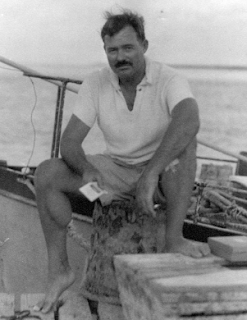Ernest Hemingway at work
Dearest Hem,
Your letter
to Pauline, dated November 1926 is a sad testament to a tortured soul when it
comes to love, and attachment, and obsession. There is so much of your passion
reflected in this letter but reflected in such a way that the figure in the
glass is a distorted, wounded, self debasing vision of the "man's
man" of a writer that you give the world. My heart breaks for you.
What I see
is that little boy Ernest, trying to be what others want, or need, or expect,
and losing himself in the process. Being the caped hero can be exhausting, and
being the caped hero who portrays wearing a cape as something for sissies is
debilitating. This process has you intentionally cutting yourself off at the
knees to prove you're a man's man and to debunk any and all stories that you
live in the shadow of your mother. When it comes to women your relationship
with your mother has forever tainted whatever comes after.
You are
desperately down when you write Pauline, "Now I can look back on the days
when I had just strait lonesomeness and waiting for you - but knowing that
everything was all right and that it was just waiting - and they seem
unbelievably happy. Because now you have given yourself and your heart as a
hostage to your mother too and the whole thing seems so absolutely
hopeless." Dear Hem, you have found a kindred soul in Pauline as you both
are held hostage by your mothers. It's no wonder that the conditions of the
separation have the capacity to reach right down and rip your heart out.
I am amazed
at your level of insight, my friend, when you write, "I know you did the
extra three months because you thought that was what Hadley wanted - and also
because at the time you were in such a state that sacrificed seemed like the
thing to do. And of course al that Hadley wanted was to delay the divorce -
anything to delay the divorce - she didn't want to just smash us both up - she
won't admit it but she knows we're the same person - sometimes she has admitted
it - but instead of giving her the delay that is practically the only thing left
in the world that she wants we railroad her toward divorce and smash ourselves
both up at the same time. That makes nice thinking too."
The most
telling thing that you share in this heart wrenching letter is when you speak
about killing yourself because of the apparent hopeless nature of the situation.
You point to the fact that you had made a promise to Pauline not to act rashly
until she had returned from her exile, but, in the light of her personal
emotional deterioration, as well as yours, you asked if this didn't excuse you
from your promise. You write, "But now it is getting all out of control
again and you have broken your promises and I should think that would let me
out. Only nothing ever lets you out. But I'm not a saint, nor built like one,
and I'd rather die now while there is still something left of the world than to
go on and have every part of it flattened out and destroyed and made hollow
before I die."
At the end
of your letter, like the soliloquy before the hero plunges the dagger into his
heart, you write, "And all I want is you Pfife and oh dear god I want you
so. And I'm ashamed of this letter and I hate it. But I had to get this poison
out and I've just been stewed in it and not hearing and all the mail boats that
get in with nothing on them and then that horrible awful letter from your
mother yesterday in which you were getting your just punishment." And
there it was, the affirmation that your own life echoed, that the punishment of
a mother is the most damning, the most damaging, the most lasting - there is
nothing more lasting than a mother's "love."
There is no
winner to be found in this version of Sartre's Huis Clos that is your life at
this point. My heart goes out to you, to Pauline, and to Hadley and Bumby who's
lives will be forever changed by these events that have been set in
motion. Sometimes there's no benefit to
identifying a winner. Sometimes it's simply about picking up the pieces after
the storm and trying to piece life back together again into something that
allows you to move on.
Hem, I trust
in your capacity to construct a story line and I trust in your ability to
create something of the pieces that lie at your feet.
Wishing you
better days,
Betsy












